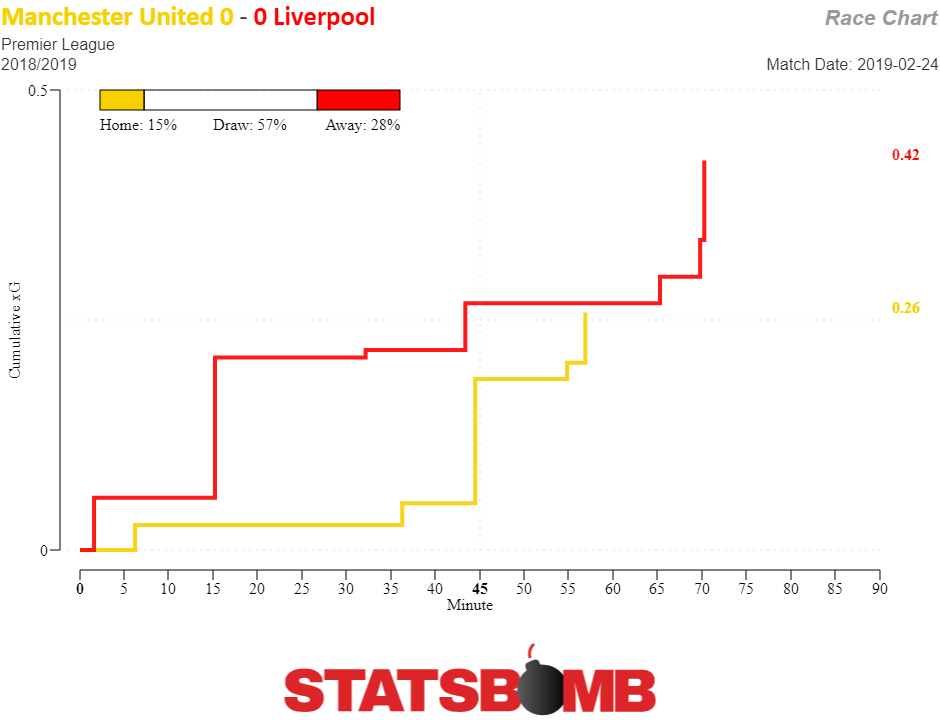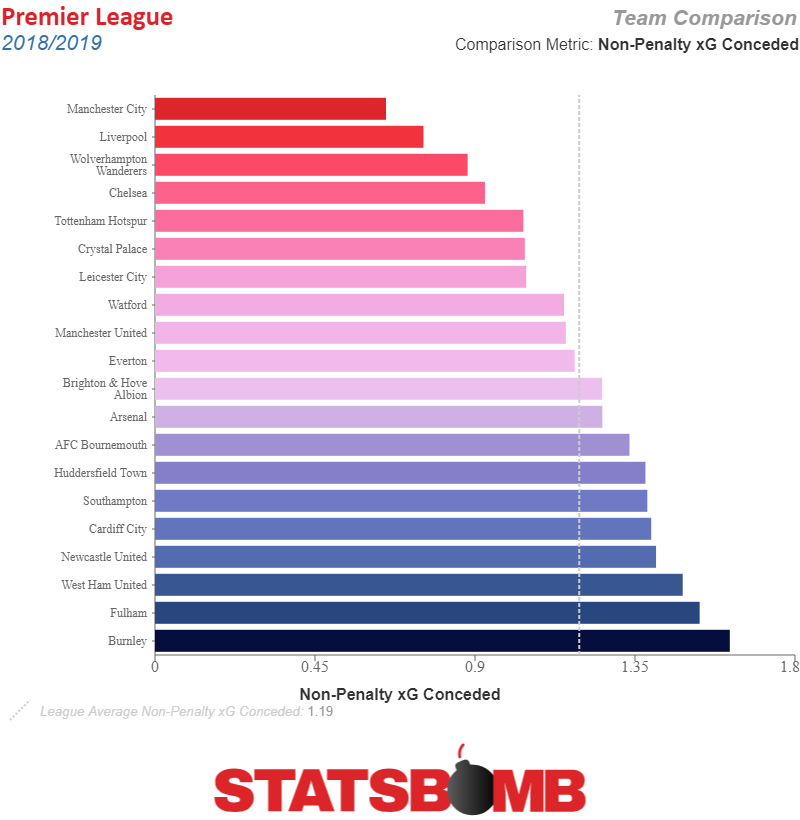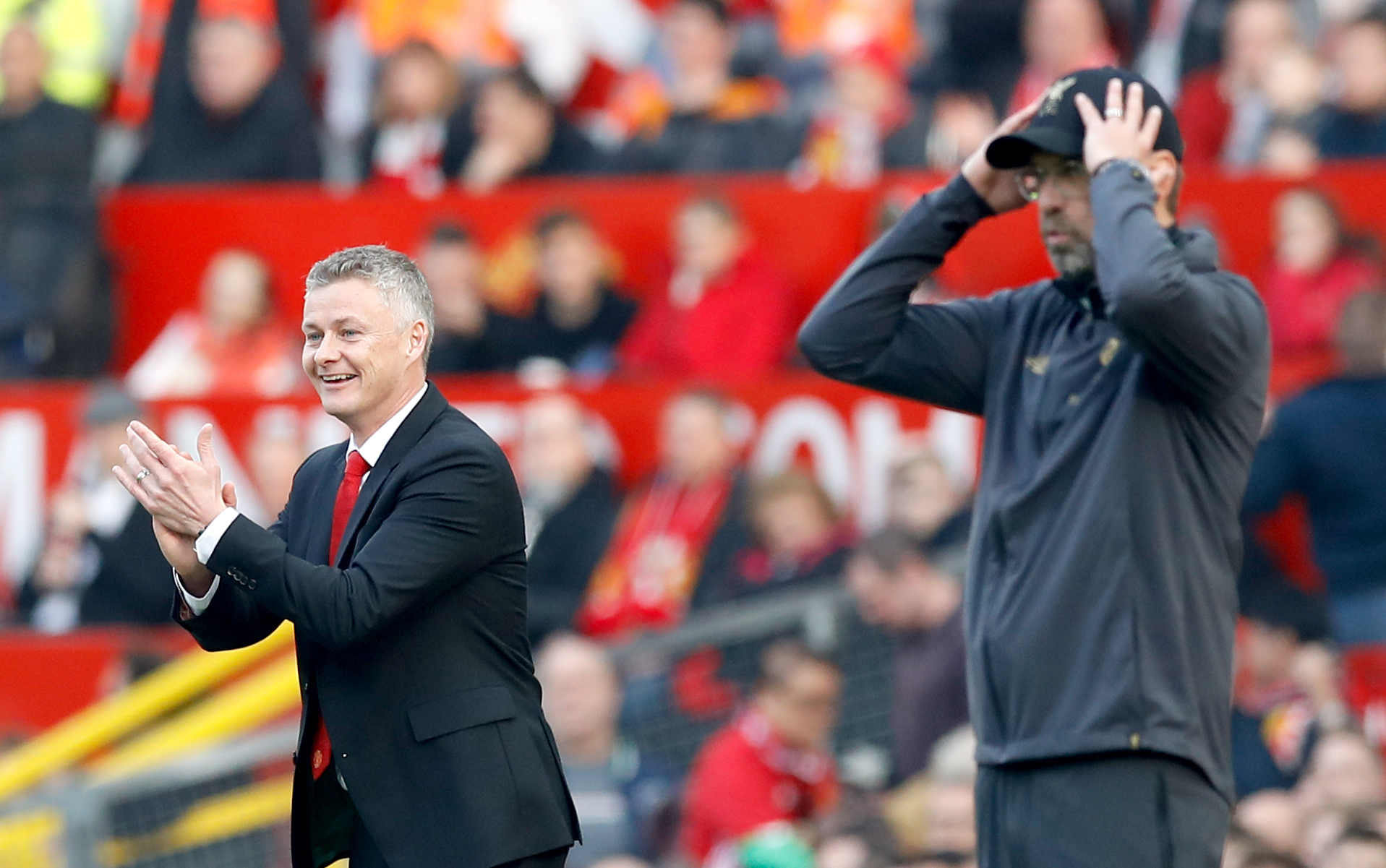Manchester United held Liverpool to a 0-0 draw at Old Trafford last Sunday. It was a surprising result. United’s resurgence has been built more on an improving attack than a stalwart defense and Liverpool are nothing if not explosive in attack. Next comes the tricky proposition of analyzing what it means. By any standard this match was a defensive one. There were only 12 total shots, seven for Liverpool and five for United. The expected goal tally was 0.42 for Liverpool and 0.26 for United. It was truly a slog of a match.  Injuries, of course, play a large story. United were forced into three first half injury substitutions, with Ander Herera, Juan Mata, and Jesse Lingard (Mata’s replacement) all forced off the field. That left the side unable to rescue Marcus Rashford from his own ankle knock. Rashford spent the bulk of the last hour of the match hobbling around at striker unable to contribute much beyond occasional grimacing link up play to United. Liverpool meanwhile lost Roberto Firmino the creative fulcrum around whom Liverpool frequently pivot between their two preferred formations. Taking all those injuries into account, it’s still eye opening that Liverpool was not able to create more against this depleted United side. United’s resurgence has been built on a more open attack featuring which has unleased Paul Pogba and freed players like Rashford, Lingard, and the also injured Anthony Martial to focus on their attacking responsibilities while trusting themselves to score enough to cover for the defense frailties they might leave exposed behind them. And here they are against Liverpool, even a Liverpool side without Firmino, stand firm and conceding nothing. What to make of that? Apportioning credit and assigning blame after a match like this is a bit like one of those logic problems where you have to figure out if a coin is slightly heavier or slightly lighter than the rest of the bunch. Was the story of this match that Liverpool played badly, thus creating the illusion of a strong United defense, or does United really have some surprising steel under the surface which Liverpool unsuspectingly ran headlong into. Or, as it usually is, is the truth somewhere in the middle. There’s also the challenge of negotiating the difference between these two team’s performance in a single match, and what it means for the rest of the season. It’s possible, for example, that United really did put in a spectacular defensive performance, even while still being only a mediocre defensive team. Alternatively, even if all that happened at Old Trafford was that Liverpool played poorly and Mohammed Salah was off his game, that doesn’t mean that Liverpool are destined to all of a sudden become an attacking struggler. Sometimes even the most potent attacks have off days. And, sure enough, soon after the match Liverpool returned to their high-octane attacking ways and thumped Watford at Anfield 5-0. That is, for comparison’s sake, a Watford side that is roughly equivalent to United in terms of expected goals allowed.
Injuries, of course, play a large story. United were forced into three first half injury substitutions, with Ander Herera, Juan Mata, and Jesse Lingard (Mata’s replacement) all forced off the field. That left the side unable to rescue Marcus Rashford from his own ankle knock. Rashford spent the bulk of the last hour of the match hobbling around at striker unable to contribute much beyond occasional grimacing link up play to United. Liverpool meanwhile lost Roberto Firmino the creative fulcrum around whom Liverpool frequently pivot between their two preferred formations. Taking all those injuries into account, it’s still eye opening that Liverpool was not able to create more against this depleted United side. United’s resurgence has been built on a more open attack featuring which has unleased Paul Pogba and freed players like Rashford, Lingard, and the also injured Anthony Martial to focus on their attacking responsibilities while trusting themselves to score enough to cover for the defense frailties they might leave exposed behind them. And here they are against Liverpool, even a Liverpool side without Firmino, stand firm and conceding nothing. What to make of that? Apportioning credit and assigning blame after a match like this is a bit like one of those logic problems where you have to figure out if a coin is slightly heavier or slightly lighter than the rest of the bunch. Was the story of this match that Liverpool played badly, thus creating the illusion of a strong United defense, or does United really have some surprising steel under the surface which Liverpool unsuspectingly ran headlong into. Or, as it usually is, is the truth somewhere in the middle. There’s also the challenge of negotiating the difference between these two team’s performance in a single match, and what it means for the rest of the season. It’s possible, for example, that United really did put in a spectacular defensive performance, even while still being only a mediocre defensive team. Alternatively, even if all that happened at Old Trafford was that Liverpool played poorly and Mohammed Salah was off his game, that doesn’t mean that Liverpool are destined to all of a sudden become an attacking struggler. Sometimes even the most potent attacks have off days. And, sure enough, soon after the match Liverpool returned to their high-octane attacking ways and thumped Watford at Anfield 5-0. That is, for comparison’s sake, a Watford side that is roughly equivalent to United in terms of expected goals allowed.  And United also reverted to form, although their form is a little harder to parse. They comfortably handled Crystal Palace, going to Selhurst Park and winning 3-1. They also gave up 17 shots in the process and despite spending most of the game with the result never truly looking in doubt, managed to be unconvincing in defense while also scoring a bunch. The earliest of early returns suggest that whatever happened between Liverpool and United at won’t actually have outsized impact on how the two teams continue to play as the season winds down. Figuring out if the coin was slightly heavier or slightly lighter at Old Trafford is an interesting and worthwhile endeavor for understanding the match, but it’s possible that it’s also one that won’t shed much light on the futures of the two teams involved. Narrowly this makes sense. Liverpool might not have been prepared to deal with losing Firmino in the moment, and his replacement, Daniel Sturridge remained largely invisible after coming on. But, given even half a week to prepare, instead of deploying Sturridge, they shifted Sadio Mane up top and started Divock Origi on the left. Meanwhile, United, outside of the context of being injured beyond belief and trying to defend and survive against a great Liverpool side, went back to their swashbuckling, if slightly vulnerable ways. Broadly this makes sense too. The search to find meaning in the Premier League’s marquee matchups is understandable but often flawed. The biggest matches of the season are often defined by two teams wrestling imperfectly to stamp their influence on a match. Results are frequently defined by which teams gets to play their preferred strategy and which team is forced to adjust. Who wins those encounters matters to an outsized degree, because in a closely contested league, every point counts, giving added importance to those moments when a squad gets to both gather points for themselves while also denying their rivals an opportunity to do the same. But, at the same time, those matches are often not the best indicators of how good a team is. The individual factors at play in an individual match between two heavyweights are often outweighed over the course of a season by how teams play against everybody else. Liverpool’s attack is great because it brings the pain week in and week out. The stutter against United isn’t bad luck, but it’s also not more important than everything else we’ve seen. The same is true of United’s defense. The concerns remain despite the performance against Liverpool. Any time Liverpool go to Old Trafford it’s a massive match. The points won and lost will frequently be consequential in the standings at the lofty end of the table. It’s important to understand why and how those games end the way they do. It’s also important to understand the limits of what they can tell us about the two teams competing in those matches. Header image courtesy of the Press Association
And United also reverted to form, although their form is a little harder to parse. They comfortably handled Crystal Palace, going to Selhurst Park and winning 3-1. They also gave up 17 shots in the process and despite spending most of the game with the result never truly looking in doubt, managed to be unconvincing in defense while also scoring a bunch. The earliest of early returns suggest that whatever happened between Liverpool and United at won’t actually have outsized impact on how the two teams continue to play as the season winds down. Figuring out if the coin was slightly heavier or slightly lighter at Old Trafford is an interesting and worthwhile endeavor for understanding the match, but it’s possible that it’s also one that won’t shed much light on the futures of the two teams involved. Narrowly this makes sense. Liverpool might not have been prepared to deal with losing Firmino in the moment, and his replacement, Daniel Sturridge remained largely invisible after coming on. But, given even half a week to prepare, instead of deploying Sturridge, they shifted Sadio Mane up top and started Divock Origi on the left. Meanwhile, United, outside of the context of being injured beyond belief and trying to defend and survive against a great Liverpool side, went back to their swashbuckling, if slightly vulnerable ways. Broadly this makes sense too. The search to find meaning in the Premier League’s marquee matchups is understandable but often flawed. The biggest matches of the season are often defined by two teams wrestling imperfectly to stamp their influence on a match. Results are frequently defined by which teams gets to play their preferred strategy and which team is forced to adjust. Who wins those encounters matters to an outsized degree, because in a closely contested league, every point counts, giving added importance to those moments when a squad gets to both gather points for themselves while also denying their rivals an opportunity to do the same. But, at the same time, those matches are often not the best indicators of how good a team is. The individual factors at play in an individual match between two heavyweights are often outweighed over the course of a season by how teams play against everybody else. Liverpool’s attack is great because it brings the pain week in and week out. The stutter against United isn’t bad luck, but it’s also not more important than everything else we’ve seen. The same is true of United’s defense. The concerns remain despite the performance against Liverpool. Any time Liverpool go to Old Trafford it’s a massive match. The points won and lost will frequently be consequential in the standings at the lofty end of the table. It’s important to understand why and how those games end the way they do. It’s also important to understand the limits of what they can tell us about the two teams competing in those matches. Header image courtesy of the Press Association
2019
What Happened at Old Trafford and Does It Matter?
By Kevin Lawson
|
February 28, 2019
